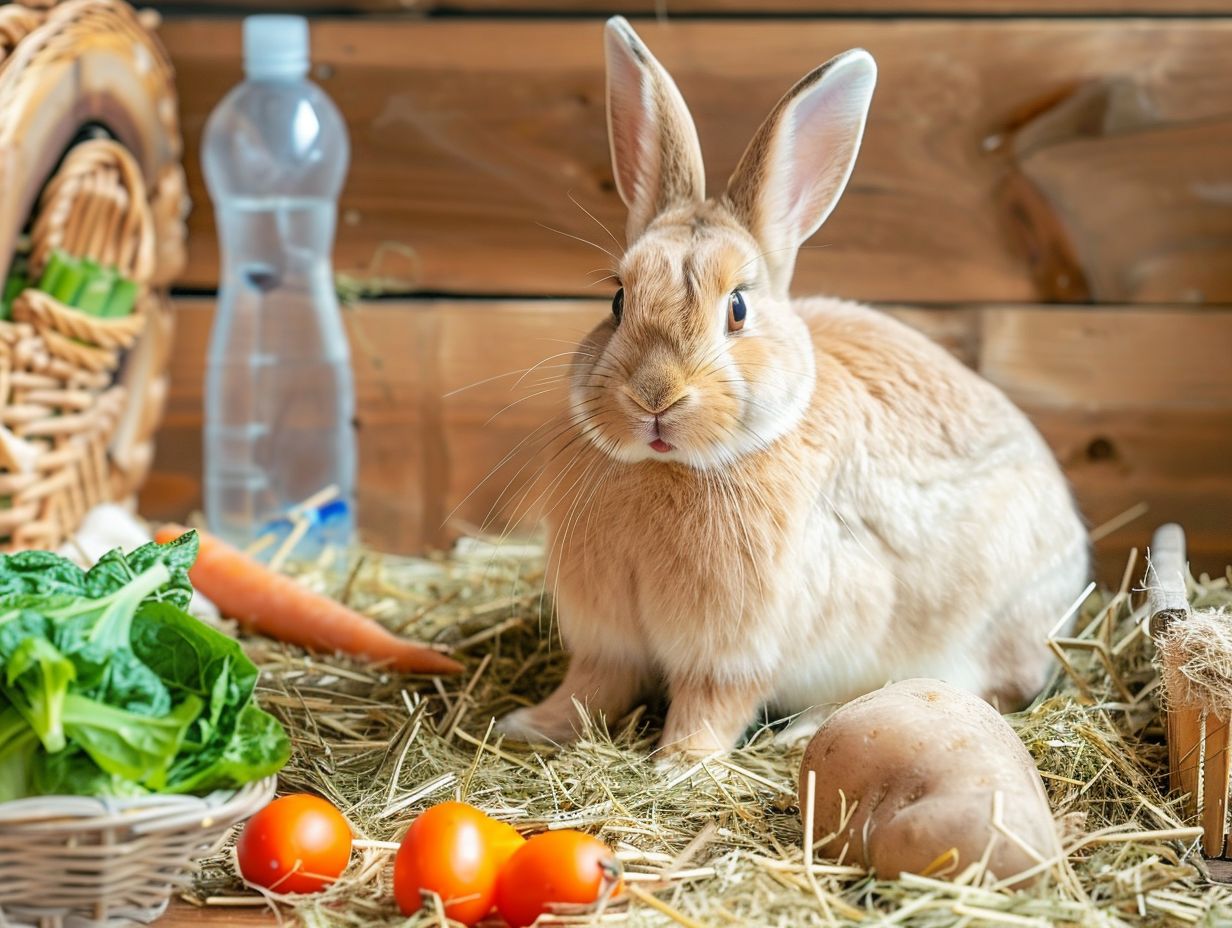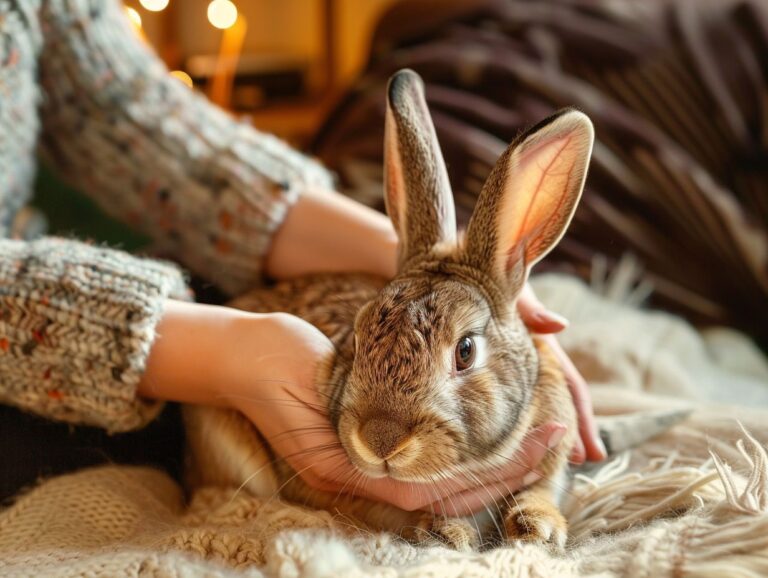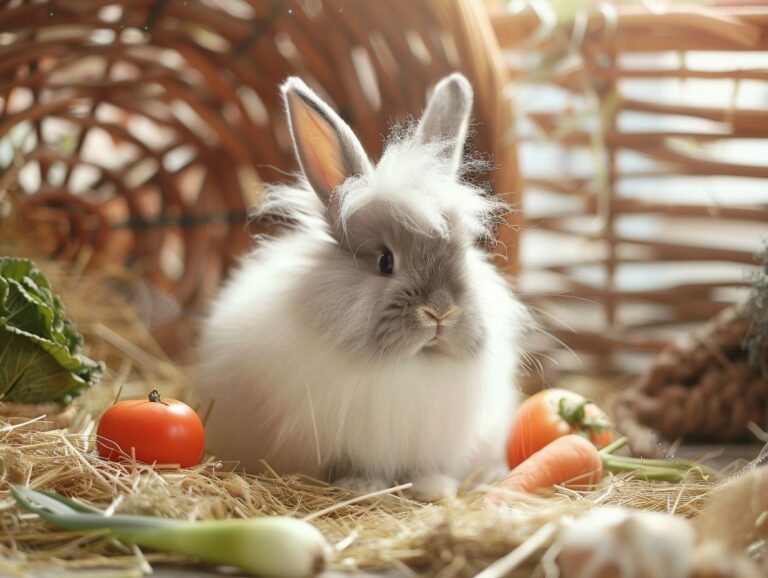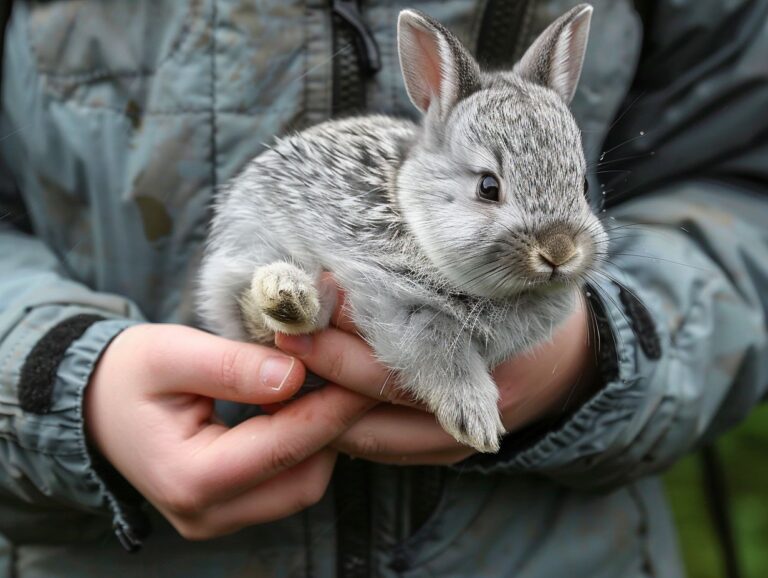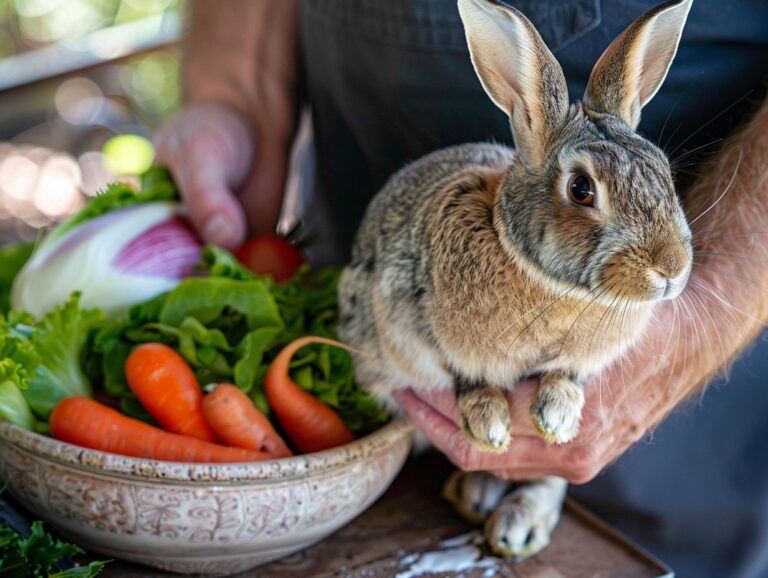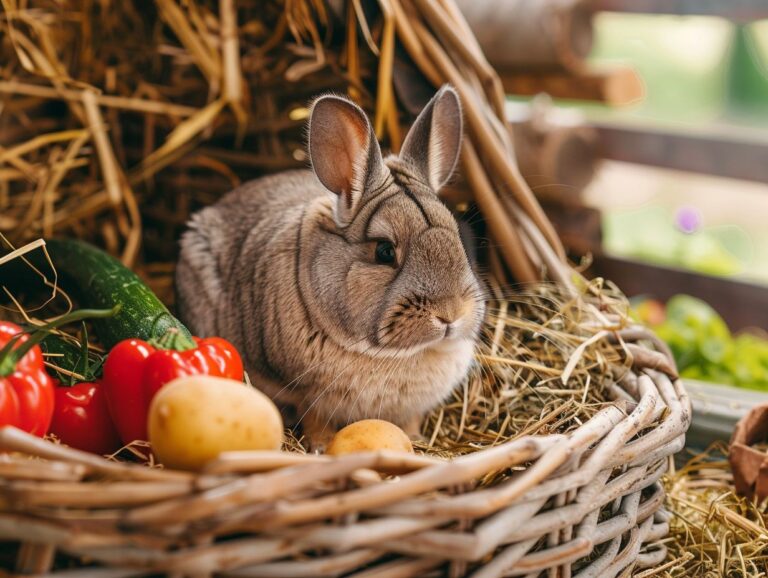Rex Rabbits As Pets: Care, Diet, and Health For Medium Sized Breeds
Are you considering adding a medium-sized rabbit breed to your family?
In this comprehensive article, we will explore the characteristics, temperament, and physical features of medium-sized rabbit breeds.
Specifically, we will delve into the world of Rex rabbits, discussing their ideal diet, basic care requirements, and common health issues.
By the end of this article, you will have a better understanding of whether a Rex rabbit is the right pet for you.
So, let’s dive in and learn more about these adorable and fluffy creatures!
Key Takeaways:
What are the Characteristics of Medium Sized Rabbit Breeds?
Medium sized rabbit breeds exhibit a range of characteristics that make them appealing as pets. From their distinct fur types to their unique behavioral traits, these breeds have become popular choices for families seeking furry companions.
Medium-sized rabbits are known for their plush fur that can come in various types, such as rex, satin, or angora. These breeds often showcase a diverse color palette, with options ranging from solid black or white to stunning agouti patterns and even striking broken patterns. If you’re interested in small breeds care, Mini Lop rabbits are a popular choice.
In terms of temperament, many medium-sized rabbit breeds are affectionate and social, enjoying human interaction and bonding with their owners. They can display playful antics and curiosity, making them delightful additions to any household.
What is the Average Weight of Medium Sized Rabbit Breeds?
The average weight of medium sized rabbit breeds typically falls within the range of 6 to 9 pounds, with variations depending on the specific breed. Mini Rex rabbits, a popular choice among pet owners, often weigh at the lower end of this spectrum due to their smaller size and compact build.
On the other hand, breeds like the Flemish Giant can weigh significantly more, ranging from 13 to 14 pounds, making them one of the largest domestic rabbit breeds.
In contrast, the Holland Lop rabbits are known for their petite size, usually weighing between 2 to 4 pounds, demonstrating the wide diversity of sizes within the medium-sized rabbit category.
What is the Temperament of Medium Sized Rabbit Breeds?
Medium sized rabbit breeds are known for their diverse temperaments, showcasing a mix of intelligence, adaptability, and unique personalities. Understanding the behavior and temperament of these rabbits is essential for effective training and bonding with these delightful pets.
Rabbits like the Mini Rex and Dutch rabbits are often touted for their intelligence and curious nature. They are quick learners, which can make training an enriching experience. These rabbits can also be quite feisty and assertive at times, so it’s important to establish boundaries early on in the training process. With proper socialization and positive reinforcement, medium-sized rabbit breeds can develop strong bonds with their owners, displaying affectionate and playful behaviors that make them wonderful companions.
What are the Physical Features of Medium Sized Rabbit Breeds?
The physical features of medium sized rabbit breeds encompass a variety of coat types, colors, and fur textures that contribute to their overall charm. Maintaining their coats through grooming and providing suitable living conditions in proper enclosures are essential for the well-being of these adorable pets.
Medium-sized rabbits can display coats in a plethora of hues, including black, white, brown, grey, and even calico patterns. Some breeds may have striking markings or appear solid in color. Their fur can range from plush and dense to sleek and soft depending on the breed. Grooming requirements differ across breeds, but regular brushing helps in preventing matting and removing loose fur, promoting a healthy coat for small breeds.
These rabbits thrive in environments that offer ample space for exercise and hopping around. A spacious enclosure with secure fencing and a cozy shelter for resting is ideal. They appreciate safe outdoor play areas but require protection from extreme weather conditions and predators like foxes or birds of prey.
What are the Basic Needs of Rex Rabbits?

In terms of their diet, Rex rabbits require a variety of fresh hay, vegetables, and a controlled amount of pellets to maintain their health. Fresh water should always be available.
Grooming these rabbits involves regular brushing to prevent matting of their luxurious coat, as well as nail trimming and ear care.
In terms of healthcare, it’s important to provide them with regular check-ups by a specialized exotic pet veterinarian and vaccinations as needed. Being mindful of their living environment, keeping it clean and spacious, is also vital for their well-being.
What is the Ideal Diet for Rex Rabbits?
The ideal diet for Rex rabbits should consist of a balanced mix of hay, fresh vegetables, and high-quality pellets to ensure their nutritional needs are met. Creating a structured diet plan that includes essential nutrients is essential for maintaining the health and vitality of Rex rabbits.
Hay is the cornerstone of a Rex rabbit’s diet, providing essential fiber for their digestive health. It should make up the majority of their daily food intake. Fresh vegetables, such as dark leafy greens and carrots, offer crucial vitamins and minerals that support overall well-being.
Pellets are another important component, serving as a concentrated source of nutrients. They should be fed in moderation to prevent issues like obesity. Water is also vital for Rex rabbits, ensuring proper hydration and digestion.
What are the Basic Care Requirements for Rex Rabbits?
Meeting the basic care requirements for Rex rabbits involves regular grooming to maintain their luxurious fur and addressing potential health issues such as dental problems, parasites, and ear mites. Providing proper care and attention is crucial for ensuring the well-being of these unique pets.
Grooming practices play a significant role in keeping a Rex rabbit healthy and happy. Due to their dense, velvety fur, regular brushing is essential to prevent matting and remove loose hair, which can help reduce the risk of hairballs. Maintaining their nails at a proper length is crucial to prevent discomfort or potential injuries. In terms of health concerns, Rex rabbits are prone to dental issues due to their continuously growing teeth; thus, providing chew toys and monitoring their dental health is vital. Parasites such as fleas and mites can also affect rabbits, so regular checks and appropriate treatments are necessary. Ear mites are common in rabbits, leading to irritation and infections, making routine ear cleaning and examinations essential parts of their care regimen.
How to Keep Rex Rabbits Healthy?
Ensuring the health and well-being of Rex rabbits involves proactive measures to prevent common health issues such as GI stasis, hairballs, Encephalitozoon cuniculi infection, and dental disease. Regular veterinary check-ups and a healthy lifestyle are essential for keeping Rex rabbits in optimal condition.
One effective strategy is providing a balanced diet high in fiber, as this helps prevent GI stasis by aiding digestion. Incorporating unlimited hay in their diet and offering fresh vegetables are crucial for preventing hairballs and ensuring proper dental wear.
Regular exercise is essential for Rex rabbits to maintain a healthy weight and prevent obesity, a condition that can lead to numerous health complications. Engaging them in playtime activities and providing ample space for movement are beneficial.
It’s also important to ensure a clean living environment for Rex rabbits to prevent infections. Regularly clean their living quarters, provide fresh bedding, and monitor for any signs of illness.
What are the Common Health Issues for Rex Rabbits?
Rex rabbits are prone to several common health issues, including dental problems, Myxomatosis, and Flystrike, that can significantly impact their well-being. Recognizing the symptoms and seeking prompt veterinary care are crucial for addressing these health issues effectively.
In terms of dental problems, Rex rabbits’ teeth are continuously growing, and if not worn down properly, this can lead to overgrowth and related issues. Regularly providing chew toys and appropriate foods can help maintain oral health.
Myxomatosis is a viral disease transmitted by biting insects which can cause severe illness and even death in Rhinelander rabbit pets.
Flystrike occurs when flies lay eggs on a rabbit’s skin, which hatch into maggots and feed on the flesh, leading to severe infections. Preventative measures like keeping the living environment clean and checking the rabbit’s fur regularly can help avoid this distressing condition.
How to Prevent Health Problems in Rex Rabbits?

Regular dental care is crucial for Rex rabbits to prevent overgrowth of teeth which can lead to pain and eating difficulties. Providing a balanced diet rich in fiber such as hay and fresh vegetables helps maintain healthy digestion and reduces the risk of GI stasis.
Effective parasite control involves keeping the rabbit’s living environment clean, using vet-approved parasite prevention products, and regular health check-ups to detect any potential issues early on.
How to Bond with Rex Rabbits?
Building a strong bond with Rex rabbits involves creating a nurturing environment based on trust, regular grooming sessions, and understanding their unique behaviors and temperament. Establishing a positive relationship through interaction and care is essential for fostering a deep bond with these affectionate pets.
The key to building trust with a Rex rabbit is to approach them calmly and gently, giving them space to acclimate to your presence. Regular handling and spending quality time with them can help them feel safe and secure in your company. Grooming, such as brushing their soft fur and trimming their nails, is not only important for their physical well-being but also an opportunity to strengthen your bond by showing them care and attention. By observing their body language and responses, you can better understand their needs and preferences, further solidifying your connection.
What are the Pros and Cons of Owning a Rex Rabbit?
Owning a Rex rabbit offers a range of pros and cons that prospective pet owners should consider. While their affectionate nature and unique fur make them delightful family pets, the grooming demands and potential health issues require careful attention and commitment from owners.
One advantage of having a Rex rabbit as a family pet is their friendly and affectionate demeanor. These rabbits enjoy being around people and can form strong bonds with their owners, making them great companions for families.
One disadvantage of owning a Rex rabbit is their grooming needs. Due to their dense fur, they require regular brushing to prevent matting and maintain their coat’s health. If you’re considering Himalayan rabbits as pets, it is important to be aware of their grooming requirements as well.
Potential health concerns like obesity and dental issues are considerations that owners need to watch out for, making regular vet check-ups essential for their well-being.
Conclusion: Is a Rex Rabbit the Right Pet for You?
Determining if a Rex rabbit is the right pet for you involves considering factors such as their temperament, grooming requirements, and compatibility with your lifestyle. Understanding the responsibilities and joys of caring for a Rex rabbit is essential in making an informed decision about welcoming one into your home.
Rex rabbits, known for their gentle nature, are ideal for families looking for a friendly and social companion. Their plush fur is not only beautiful but also easy to maintain, requiring regular grooming to keep it healthy and tangle-free.
In terms of their diet, a balanced mix of hay, fresh vegetables, and pellets is essential for their well-being. Ensuring a safe and spacious living environment, with opportunities for exercise and mental stimulation, is crucial for their overall happiness. Consider tan rabbits as pets.
It’s vital to consider if you have the time and commitment to provide the care, attention, and love that a silver rabbit deserves before deciding to bring one into your home.
Frequently Asked Questions
Can Rex rabbits make good pets?

What kind of care do Rex rabbits need?
Rex rabbits require basic care such as providing a clean and spacious living environment, regular grooming, and annual check-ups with a veterinarian. They also need daily exercise and mental stimulation to maintain their health and happiness.
What should I feed my Rex rabbit?
A balanced and nutritious diet is crucial for the health of your Rex rabbit. They should have access to fresh hay at all times, along with high-quality rabbit pellets and a variety of fresh vegetables and fruits.
How often should I take my Rex rabbit to the vet?
It is recommended to take your Rex rabbit for an annual check-up with a veterinarian. However, if you notice any changes in their behavior or physical health, it is best to schedule a visit as soon as possible.
Are Rex rabbits prone to any health issues?
Like all rabbit breeds, Rex rabbits can be susceptible to certain health issues such as dental problems and gastrointestinal stasis. It is important to monitor your rabbit’s health and seek immediate veterinary care if you notice any concerning symptoms.
How big do medium sized Rex rabbits typically get?
Medium sized Rex rabbits usually weigh between 6 to 9 pounds. However, the exact size may vary depending on the individual rabbit’s genetics, diet, and exercise levels. It is important to provide them with a spacious living environment to prevent obesity and other health problems.

